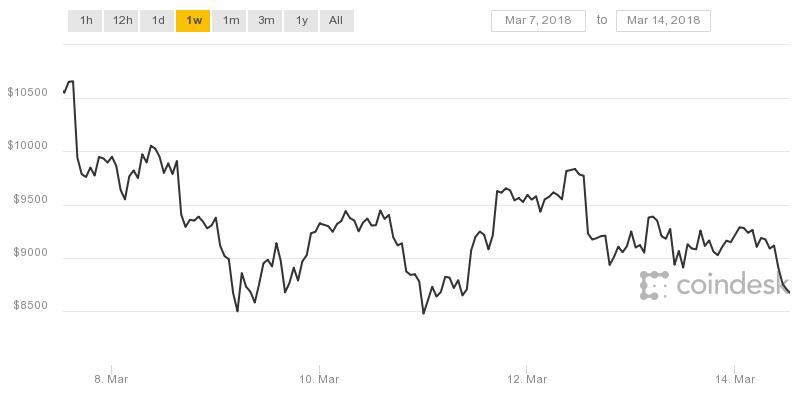The fear is that a wildly unregulated market in which millions have already been lost - even by ostensibly sophisticated investors - suggests that the big tech companies have to be more careful about legal liability and their credibility if they want to stem growing demands for regulation. JL
Kate Rooney and Jillian D'Onfro report in CNBC:
Bitcoin prices fell 9%, below $8,000, following news that Google plans to ban cryptocurrency advertising. Bitcoin fell 12% in January after Facebook announced it would ban (such) ads. Google makes 84% of its revenue from advertising, so convincing advertisers that its ecosystem is safe is critically important. "We don't know where the future is going to go with cryptocurrencies, but we've seen enough consumer harm or potential for harm that we want to approach with extreme caution."
Bitcoin prices fell below $8,000 on following news that Google, the world's largest online ad provider, plans to ban cryptocurrency advertising.
Facebook, the second largest online ad provider, took similar action in January.
Tech giant Google announced an update to its financial services policy that will restrict advertising for "cryptocurrencies and related content" starting in June.
Bitcoin fell 12 percent in late January after Facebook announced it would ban ads on "binary options, initial coin offerings and cryptocurrency." The social media giant said it would prohibit ads for financial products and services "that are frequently associated with misleading or deceptive promotional practices."A report of a Commodity Futures Trading Commission subpoena on major cryptocurrency exchange Bitfinex and an Securities and Exchange Commission emergency asset freeze on an initial coin offering added to negative sentiment that day.
Despite the news Wednesday, Brian Kelly, CEO of BKCM, said the crackdown could be an upside for digital currencies.
"It's a good thing for the industry, Facebook and Google ads were always a red flag for me," Kelly said. "It's not having any impact on price."
Kelly attributed the downward moves to more global regulatory fears.
"Selling is driven by fear of another China ban, supposedly coming in next 24 hours," Kelly said. "My view is it will be a nothing burger since China has been banning bitcoin since 2013."
Bitcoin's one-week performance
Source: CoinDesk
Separately, a House Financial Services subcommittee is set to hold a hearing on cryptocurrencies and initial coin offerings Wednesday.
Bitcoin prices dropped from above $11,000 to below $9,000 last week following a statement by the SEC that expanded its scrutiny to cryptocurrency exchanges, and news of compromised accounts on a major Hong Kong-based exchange Binance.
Jack Tatar, co-author of "Cryptoassets: The Innovative Investor's Guide to Bitcoin and Beyond," pointed to continuing regulatory uncertainty in Wednesday's price moves.
"We also have the threat and lack of clarity about regulations which is also weighing on the entire cryptoasset space, not just bitcoin," Tatar said, adding that any break below $8,000 "will be disconcerting."
Other cryptocurrencies, or "alt-coins" moved in lockstep Wednesday. Ethereum fell roughly 9 percent from the open, trading near $627 as of 1:30 p.m. ET, according to CoinDesk. Bitcoin cash fell 9.1 percent from the high and was trading near $971 Wednesday.
Google is cracking down on cryptocurrency-related advertising.
The company is updating its financial services-related ad policies to ban any advertising about cryptocurrency-related content, including initial coin offerings (ICOs), wallets, and trading advice, Google's director of sustainable ads, Scott Spencer, told CNBC.
That means that even companies with legitimate cryptocurrency offerings won't be allowed to serve ads through any of Google's ad products, which place advertising on its own sites as well as third-party websites.
This update will go into effect in June 2018, according to a company post.
"We don't have a crystal ball to know where the future is going to go with cryptocurrencies, but we've seen enough consumer harm or potential for consumer harm that it's an area that we want to approach with extreme caution," Scott said.
Google's hard-line approach follows a similar ban that Facebook announced earlier this year.
While the crypto-currency boom has produced a lot of excitement and wealth, it's still a largely unregulated space and has spawned countless high-profile scams.
This news comes as Google releases its annual "trust and safety" ads report.
Google said it took down more than 3.2 billion ads in 2017 that violated its policies, which is nearly double the 1.7 billion it removed the year before.
Google parent company Alphabet makes roughly 84 percent of its total revenue from advertising, so convincing advertisers that its ecosystem is safe and effective is critically important.






















0 comments:
Post a Comment